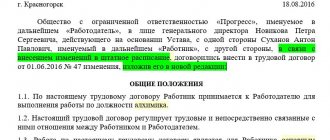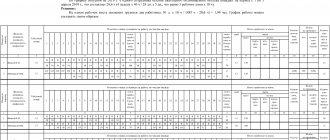Hello! In this article we will tell you everything about being late for work.
Today you will learn:
- What is considered late?
- How is being late different from absenteeism?
- What sanctions can be applied to an employee for non-compliance with labor discipline.
- Instructions for dismissing an employee for being late.
What is considered late for work?
When a person is at the workplace, he is obliged to obey the charter of the enterprise and the work schedule. An employee does not have the right to come to work whenever he wants (exception if the position provides for a flexible schedule).
Some irresponsible employees believe that being a little late will not entail any consequences. But this is a misconception. First, let's figure out what is considered late.
Lateness is the absence of an employee from the workplace for any reason from 1 minute to 4 hours.
Some managers allow employees to be late by up to 5 or 15 minutes. But this is at the discretion of the authorities. However, if such violations are systematic, then sooner or later the employer will get tired of such negligent attitude towards labor regulations.
The Labor Code says nothing about the concept of “lateness”. It is called differently - violation of discipline.
Let's look at examples of delays:
- Absence of an employee at the beginning of the working day;
- Late return of the employee from lunch break;
- Leaving the workplace on your own initiative without warning anyone;
- An employee leaving work before the end of the working day.
When hired, each employee signs an employment contract, which spells out all the rules of the enterprise and the daily work schedule.
If this agreement does not contain a clause on lateness, or the employee for some reason was not familiarized in writing with the rules of being in the workplace, he cannot be held accountable. Otherwise, he can go to court.
The myth of 15 minutes
Lateness is absence from work during working hours. There is no minimum limit. For some reason, a certain myth has taken hold in our country that being absent from work for 15 minutes does not have any consequences.
However, this is not true, and even a delay of a couple of minutes, which is recorded using automation, will be noticed and will lead to the initiation of proceedings.
A number of organizations work on a fairly flexible schedule, in which those same 15 minutes will not be a serious offense in the eyes of management. But even in the absence of a strict routine, being late for more than four hours without a valid reason will be considered a serious violation.
Late for a valid reason
If you are a strict manager and notice that your subordinate is absent from the workplace, do not rush to punish him. First, you need to figure out what caused the delay, because force majeure circumstances happen in the life of any person.
Not every person can be punished for being late. Such violations are divided into lateness for a valid reason and for an unexcused one.
Valid reasons:
- Employee illness;
- Illness of his relatives and close people (for example, a child);
- Death of one of the relatives;
- Natural disasters, accidents, etc.
Any lateness for a valid reason must be documented. This could be sick leave or other medical certificates.
If you were flooded by your neighbors, then a certificate from the housing office; if you were in a car accident, a certificate from the traffic police; if the fault was due to broken public transport, a certificate from the motor vehicle transport service that services this route.
A traffic jam is not considered late for a valid reason.
What reasons for being late are considered valid?
Fine as punishment for being late
The law does not clearly define valid and unexcusable reasons for being late for work. However, it is customary to consider as valid reasons those that arose not through the fault of the employee and arose under the influence of force majeure: illness, natural disaster, utility accident, death of a close relative, etc.
If you cannot provide convincing evidence of a good reason, you can mention witnesses to the incident who can corroborate your claims. Unfortunately, a traffic jam is not recognized as a valid reason.
Although this is one of the most common reasons for tardiness in large cities, the employee will still be disciplined if the employer is not lenient. If a traffic jam occurs due to a traffic accident, you can try to get a certificate from the traffic police, but this is not always possible, and such a document is not always valid. The employer may simply state that you must leave home earlier and anticipate the possibility of transportation problems.
Moreover, the reasons for lateness due to the fault of the employee are not valid. “I overslept” is a common excuse, but it will only cause irritation for the employer, since the boss always has to get up on time. If you can't bring yourself to follow a routine, you should try to negotiate with your boss about a more flexible and more comfortable work schedule.
In some companies where employees' activities involve creative work, there is no concept of set working hours at all.
Employees come to the office when it is most convenient for them, but they are expected to spend a certain amount of time in the workplace. Recording systems allow you to control the time of arrival and departure, and the effectiveness of workers is assessed based on their performance results. Such a system provides work comfort, since a person may not adapt to the general schedule, but in many areas of activity it is not yet applicable.
What is the difference between being late and absenteeism?
Sometimes managers mistakenly assume that being late and absenteeism are the same thing. But that's not true.
Let's look at the main differences in the table.
| Criteria | Late | Absenteeism |
| Classification | Violation | Serious violation |
| Time frame | Absence of an employee from his workplace from 1 minute to 4 hours | Absence from work or absence without notifying superiors for 4 hours or more |
| Punishment | Reprimand, reprimand, dismissal (you cannot be fired for one delay) | 1 absence = dismissal |
| Where is it fixed? | In the access system (if there is one) | On the time sheet |
| Design features | An explanatory note, an act of lateness, an order for collection are drawn up | The manager has the right not to demand explanations from the violator and not to draw up any acts. He can issue an order on his own initiative and dismiss the employee |
Concept of being late
The Labor Code does not contain an exact definition of lateness, but it is considered that such behavior on the part of a hired specialist constitutes a violation of discipline. When signing an employment contract, the employee undertakes to follow the basic rules of conduct in the company. He develops a certain daily routine, so if the rest and work schedule is violated, then this is a serious offense.
According to the Labor Code, being late for work is a disciplinary violation. This is due to the fact that the specialist cannot fully cope with work responsibilities, since he is absent from the workplace.
Lateness is represented by a citizen’s absence from work for up to 4 hours in the absence of a valid reason, and if this period is exceeded, the offense is qualified as absenteeism.
Since such behavior by an employee violates internal regulations, the employer must first familiarize the specialist with this document. If the employee’s signature is missing on the document, then he will not be subject to disciplinary action.
Punishment for being late
Being late is not considered a serious violation, so punishment can only be disciplinary.
These include:
- Note – if the employee was late once;
- Reprimand – 2 or more latenesses;
- Severe reprimand – delays are systematic;
- Dismissal – regular lateness (3 times or more).
If the reason for being late was valid, and the employee has documented this, then no punishment will be imposed.
For 1 such violation, one disciplinary sanction is provided. The manager can apply punishment within 6 months after the violation. All penalties are canceled after 1 year.
If an employee has been reprimanded for a violation, the manager may remove it before the 12-month period, provided that this does not happen again.
The manager may impose a fine or reduce wages for lateness. This is contrary to the Employment Agreement. If this is allowed at an enterprise, then management may be held administratively liable.
Mistakes of employers when dismissing
An employee has the right to consider dismissal for being late for work to be unlawful and appeal it in court. But if the boss fully complies with the legal requirements, then it will not be possible to challenge the decision.
The court takes the employee’s side in the following cases:
- if the employer did not formalize past penalties;
- when the administration fired for absenteeism, simply adding up the time of lateness ;
- if the employer fired a person who was late for a good reason;
- when the boss does not take into account the duration of past penalties.
Order to impose a disciplinary sanction
Important! The consequence of such violations from the authorities will be reinstatement and payment for absenteeism.
But you should not expect that relations with management will be positive after this.
Step-by-step instructions for dismissal for being late
According to the Labor Code of the Russian Federation, it is impossible to fire an employee for one delay. If an employee systematically violates labor discipline, the manager has the right to dismiss the negligent employee on his own initiative in accordance with Article 192 of the Labor Code of the Russian Federation.
The sequence of actions in this case is as follows:
- When the employee is late for the first time, he is obliged to write an explanatory note, where he will state the reason for his action and attach the available certificates to the document. This must be done within 48 hours.
- If within 2 days the employee does not provide the appropriate note and refuses any explanations, a Statement of Refusal of Explanations is drawn up in the presence of 3 witnesses.
- If the reason is not valid, then a lateness report is drawn up. This document must be signed by 2 witnesses who confirm the fact of the violation.
- If the violation is identified by the head of the unit, who does not have the right to impose a penalty, he writes a report addressed to his management and attaches the necessary documents.
- After this, the head of the company sets a date and time for the analysis, where all involved persons are invited.
- Based on the drawn up act and the analysis carried out, the enterprise issues an order, which will indicate the sanctions applied to the violator.
- After this, it is necessary to familiarize the employee to whom the penalty is being applied with the order. If an employee refuses to sign an order, then a corresponding act is drawn up and signed by 3 witnesses.
- The second delay is processed in the same way as the first.
- If the employee is late for the third time, the manager may fire the employee on his own initiative. In this case, the following reason should be indicated in the work book: “Systematic violation of labor discipline.”
Responsibility under the Labor Code
The Labor Code of the Russian Federation does not have a definition of what being late for work is. But there is a general concept called violation of discipline.
When an employee signs an employment agreement, he voluntarily agrees to perform a number of duties and participate in the production process, following the employers' routine. The latter provide the regime of work, as well as rest, at the enterprises that are entrusted to them. In this case, the regime is considered part of the rules that must be observed, which is called labor discipline.
Being late for work is considered a disciplinary offense, which is associated with the inability to perform duties due to the fact that the employee is not at his workplace.
If the time period exceeds four hours, then this can be classified as absenteeism . For this reason, an employee can be dismissed under an article of the Labor Code of the Russian Federation. A corresponding note will be made in the work book, which may become a serious problem in the future and interfere with employment. Because of this, most enterprises give employees the opportunity to write a letter of resignation of their own free will.
There is an opinion that even for being five minutes late, the company's management can fine a subordinate. This is confirmed by numerous rumors about evil bosses who impose such sanctions on employees. But Article 192 of the Labor Code establishes a closed list of disciplinary sanctions, which include:
- Comment.
- Rebuke.
- Dismissal (in case of repeated violations and failure to fulfill duties).
However, the legislation does not provide for fines for such offenses. Of course, experienced lawyers can find loopholes in the laws that allow them to influence latecomers with material penalties. But this will require thoughtful legal justification and execution.
If management intends to hold a person accountable for being late, this fact must be recorded:
- At the checkpoint.
- In the memos of the immediate superior.
- In the act of violation.
The mechanism for recording a violation can be prescribed in the internal regulations of the enterprise. In order to find out the reason, you can ask the subordinate for an explanation in writing. If there is a good reason that was not taken into account when determining the measure of disciplinary liability, there remains the possibility of challenging it in court.
Employers are advised not to use severe sanctions for misconduct that may be considered minor. Article 192 of the Labor Code states that when imposing penalties, one must take into account the severity of the offense, as well as the circumstances under which it was committed.
If because of this a subordinate is deprived of a bonus, such a sanction is considered illegal. Despite the fact that deprivation of bonuses can be considered a penalty similar to disciplinary, the Labor Code does not provide for this. To deprive a bonus or reduce its size, it is required that the enterprise have a special provision for the calculation of bonuses. It must establish the condition of mandatory compliance with labor discipline for bonuses.
Mistakes that managers can make when trying to quit
Before dismissing an employee, the manager must understand that violators sometimes disagree with the employer's decision. They go to defend their rights in court.
If management acted within the framework of the Labor Code, then the court will be on the side of the employer. If an employee proves the illegality of the actions committed against him, he will have to be reinstated at the enterprise.
Let's look at the main mistakes that managers make when dismissing someone for being late:
- The employee was fired after being late for 2 times, but there was no written confirmation of the first violation (it was not documented);
- The employee was late 2 times, but only one was for an unexcused reason;
- If the period between two delays was more than 12 months;
- The employer summed up all the employee’s tardiness and called this violation absenteeism;
- There were 2 violations, but no penalty was imposed for one of them.
Possible sanctions for dismissal
In some cases, being a couple of minutes late can have serious consequences.
Lateness is considered a minor violation, but disciplinary liability is provided for it. At the same time, it is important to know that the Labor Code of the Russian Federation specifies only the following options for penalties: reprimand, reprimand, severe reprimand, dismissal. At the same time, the Labor Code does not allow any fines or deductions from an employee’s salary for missed minutes: any change in wages is a deviation from the terms of the contract, therefore, according to the law, it is unacceptable.
However, many companies have found a way out of this situation: the majority of their salaries are bonuses, the size of which can be easily changed at the request of management. In such organizations, the most common sanction for lateness or absenteeism is deprivation of the bonus in whole or in part, for example 30 or 50%. Since it is not regulated by an agreement, the company’s management acts within the framework of the law.
Another important condition: for one offense, an employee can be punished only once. If it comes to a conflict with management, the most serious thing that awaits an employee upon the first offense is one severe reprimand entered into his personal file. There are no additional fines or other sanctions.
More serious punishment is imposed for repeated violations of labor discipline. If an employee is late several times for unexcusable reasons, he may be fired for failure to perform duties; an entry will be made in the work book that prevents further employment.
Lateness and other violations do not accumulate: the violation is considered extinguished if more than 12 months have passed since its moment, and during this period the employee no longer deviated from the rules.
The procedure for imposing penalties
Failure to report to work on time without a good reason may result in penalties.
To implement such a procedure, the manager needs to perform several simple steps. You should start by requesting a report from the violator’s immediate superior, as well as a certificate of the worker’s absence from the workplace. After this, it is necessary to request written explanations from the violator.
Quite often, people refer to the impossibility of submitting supporting documents due to the length of time it took to prepare data in the authorized body to which they applied, or the loss of information already received. In such a situation, you can make a request for relevant content in order to verify the authenticity of the person’s words.
Having received the necessary information and data, the manager is obliged to carefully study the available materials and make a decision within the period established by law.
The entire procedure is completed by issuing a corresponding order from the head of the company.
Documenting the violation
Before starting all the necessary activities, it is necessary to record the fact of being late. To do this, the immediate superior of the absentee is obliged to draw up a report. Such a document is drawn up in the presence of at least two workers who sign it.
Then the boss who identified and recorded the violation is obliged to draw up a report. It must indicate the date and period of the person’s absence from his place. In principle, there is no need to reflect any more data in the note, since it, like the act, are documents that only record the very fact of being late.
The specified documentation must be transferred to the head of the company.
Explanatory note from the employee
According to current standards, before applying a disciplinary measure to a worker, the manager is obliged to request written explanations from him regarding the current situation.
It should be noted that the absence of this explanatory note is not an obstacle to applying punishment to a person. However, for this to happen, the following conditions must be met:
- the violator must refuse to give explanations;
- the fact of refusal must be recorded in an act.
Explanations must be submitted within two working days, otherwise a statement of refusal is drawn up.
The current standards have not established the employee's explanatory form. However, the text must indicate not only the period of delay, but also the reasons for this.
It would be correct for the manager to demand that the employee indicate which authorities he contacted in the event of an accident or if he was feeling unwell, in order to send requests to check the person’s explanations.
What does the Labor Code of the Russian Federation say?
Article 192 of the Labor Code regulates the actions of the boss when employees violate internal regulations at the enterprise. Dismissed truants have the right to sue and can win the case if they did not sign the labor regulations or agreed to them verbally.
Some employers do not know how to record tardiness and cannot provide evidence of the violation. Without official papers there was no violation.
If the company has an electronic access system, the fact of being late is recorded automatically. In other cases, the violation is proven after an attendance check.
The boss draws up an act in which he states who, in what quantity and when was late for the workplace. The violator receives the act and puts his signature on it. In response, he writes an explanatory note addressed to the manager and sets out the reasons for being late.
Article 81
Article 81 of the Labor Code establishes that the employer has the right to dismiss an employee if he repeatedly violates labor regulations or does not fulfill his duties. You cannot be fired for 1 delay.
Responsibility and possible punishment
Like any disciplinary violation, being late for work entails liability.
In accordance with the Labor Code (Article 192), disciplinary liability may be of the following nature:
- comment;
- rebuke;
- severe reprimand;
- dismissal.
However, the law does not provide for any penalties. The use of such punishment by management is considered illegal and may cause employees to go to court.
The first delay to work, for any time up to 4 hours, cannot cause serious punishment. Management may oblige you to write an explanatory note indicating the reason for the delay. Repeating the situation a second time is fraught with a reprimand from management and a written warning.
Responsibility for systematically being late for work (more than 3 times) is more significant. An employer has the right to dismiss an employee who regularly violates labor discipline standards . At the same time, a record of failure to fulfill duties may be made in the work book, which will lead to problems with getting a job in the future.
It is important to consider that repeated lateness is a serious violation. At the same time, the time of delay does not play a big role if it does not exceed 4 hours. Accordingly, the probability of dismissal of an employee who is late for work 3 times by 10 minutes is higher than the probability of dismissal of an employee who is late for work once by 2 hours.
What actions to take if you are late
If it is not possible to get to your workplace on time, it is important to follow some rules. It is not advisable to lie about the reason for being late.
Under no circumstances should you provide false certificates or other written excuses that do not correspond to reality. The authenticity of documents is easily verified. An employee caught in such a deception will most likely be fired. In addition, consequences (including criminal punishment) may also affect the person who issued the certificate.
The following actions will help to reduce sanctions to a minimum and avoid serious punishment:
- Warning the boss about a possible delay;
- Worry about the evidence base for a valid reason for being late (certificate from the hospital, housing office, etc.);
- At the request of your superiors, write an explanatory note explaining the reasons for the action. All certificates justifying the delay are attached to the note.
Whatever the reason for absence from work, it is important to understand that this is a disciplinary violation. The best way out of the situation is to resolve the issue peacefully with the employer by agreeing to work at lunchtime or after the end of the working day. The first notice of a violation should be a signal for the employee to be more attentive to the work routine.
Reasons for violation
Due to the absence of the very concept of lateness in the legislation, there is no distinction between its reasons as valid and disrespectful.
Based on existing practice, managers consider late attendance at work acceptable in the following cases:
- emergencies;
- domestic accident;
- illness or death of a close relative;
- a sharp deterioration in the health of the employee himself;
- road accident;
- unexpected change in public transport operations.
To confirm the facts, the employee must present a certificate from a doctor, a conclusion from the traffic police, documentation from the housing complex and other official evidence. Without them, management has the right to impose disciplinary sanctions.
We recommend you study! Follow the link:
Labor Code on the reasons for dismissal of an employee
Unfortunately, the presence of traffic jams on the roads does not allow us to regard the presence of traffic jams as valid reasons for being late for work. In this case, only a small loophole is possible: if the cause of the traffic jam was an accident, then theoretically you can request a certificate about this from the traffic police. However, it is unlikely to be provided to those not involved in the accident.
In many ways, the result of management's reaction to an employee's tardiness is determined by his behavior after the violation.
To minimize the possible consequences of being late, you should adhere to certain rules:
- warn your immediate supervisor in advance about the delay and verbally explain the reasons for what happened (even unexcusable reasons should be honestly voiced immediately);
- if there is a serious reason for absence from work, you should, if possible, obtain documentary evidence;
- Upon arrival at work, write a written explanation for being late.
You should not try to lie or, especially, forge documents, since criminal liability is already provided for this. Moreover, consequences will await not only the employee, but also the person who provided him with false evidence.
The explanatory note is written in free form on an A4 sheet, since this is an internal document of the institution.
It states:
- full name of the enterprise;
- initials and position of the immediate superior or other manager authorized to resolve personnel issues;
- Full name and position of the late employee;
- the title of the document, written on a new line in the center;
- the text of the explanation is written in full detail indicating the reasons for the delay, the size of the element is unlimited;
- date of writing and signature of the late worker.
The document is submitted to the immediate supervisor or the human resources department along with other necessary evidence.
If, after presenting supporting documents or an oral explanation of the reasons for the incident, the employer does not require any other action from the subordinate, the situation is considered resolved. This means that the reason for being late is considered valid and no punishment will follow.








